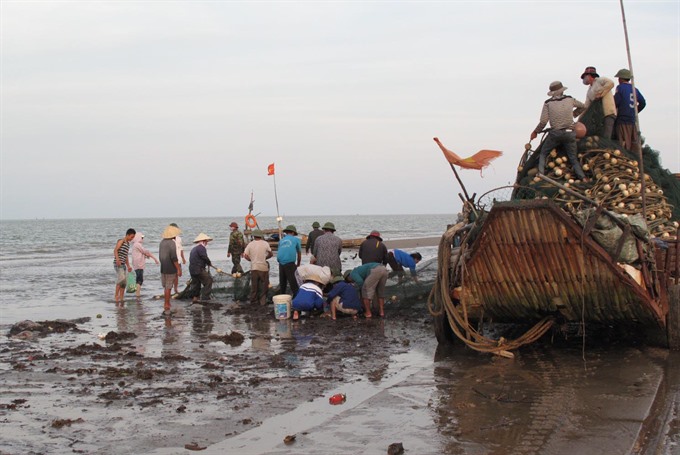 Society
Society

Bottom trawling is a particularly destructive method of fishing, in which huge weighted nets are dragged the sea floor, catching everything in their path, leaving behind a trail of emptiness.
 |
| Similar to using boats, a manual form of bottom trawling - which also makes use of huge nets that can cover a portion of nearshore sea - can drag in every form of sea life in that area, and a still common in the central province of Nghệ An. — VNA/VNS Photo Nguyễn Văn Nhật |
CENTRAL REGION — Bottom trawling is a particularly destructive method of fishing, in which huge weighted nets are dragged on the sea floor, catching everything in their path.
Nguyễn Văn Việt, a fisherman from Hoài Nhơn District in the province of Bình Định, said locals here considered bottom trawlers to be ‘sea demons.’
“The setup is either one trawler or two trawlers running in tandem, dragging a huge net with very fine holes, scooping up fish of all sizes. Other than the fact that all sea creatures are caught and bycatches are discarded, the ecosystem along the sea floor is irreparably damaged,” Việt said.
Trawlers operating illegally in this part of the sea not only threaten the sustainability of sea resources but are also a menace to other fishermen.
Dangers
Just last week, 33-year-old fisherman Trần Anh, from the province of Quảng Trị, nearly met his maker. At around 10pm, he was on his small boat, when he saw two high-capacity trawlers, dwarfing his own vessel, approaching at high speed. He repeatedly signalled his presence, but the two boats kept speeding towards him. As they got closer his boat and everything on it – fishing nets, the day’s catch – was thrown into the water due to the wake. Luckily, Trần Anh managed to grab a flashlight before his boat sunk entirely, and was rescued by a nearby squid boat.
The captain of the other vessel, Trần Bình, wanted to give chase and demand that the trawlers return to help salvage Trần Anh’s floundering boat. However, the trawlers had already turned off their lights and vanished.
Anh had memorised the licence plates of the two trawlers, later found to be from neighbouring Quảng Ngãi Province.
In a single night, Trần Anh lost his entire livelihood – estimated at VNĐ50 million (US$2,200) – and would struggle to provide for his poor family of five, with three children still in school.
Head of Trần Anh’s village, Trần Luân, said his case was just the most recent out of 30 similar incidents since April in this village alone, causing total losses of VNĐ300 million ($13,200), not a small sum for the poor fishermen here.
Nguyễn Văn Hiền, 32, a fisherman from the same village, fully aware of the dangers posed by reckless trawlers, has deployed lights on the ends of his driftnets to prevent them from being torn apart by trawlers, all to no avail. Trần Ngọc Lâm, another fisherman, complained of 35 missing nets in just one day in late March.
“The fishermen here are very worried, since their nets are destroyed by the irresponsible trawlers. Local authorities are running a charity campaign to support Trần Anh. Concerned agencies really need to take stricter measures to protect the fishermen,” Trần Luân said.
Authority’s response
Nguyễn Hoài Nam, head of the Quảng Trị’s Department of Aquatic Resources Exploitation and Protection, said the province is trying to locate the two runaway trawlers. Putting an end to illegal operations of trawlers is “an uphill battle,” Nam said, citing aggressive and even violent reactions by the operators of trawlers when the authorities try to subdue them last April.
In addition, Nam suspected that trawler operators even hired ‘informants’ to keep an eye out for authorities.
“We once deployed a patrol boat to watch over an island as a diversion, then quickly sped towards the sea around Triệu Lăng Commune, but the trawlers somehow escaped in time,” Nam said.
Nguyễn Đình Cường, deputy head of the local border guard, shared Nam’s suspicion, adding that 3-5 patrols are deployed every month, but it’s hard to catch the trawlers, especially when their operations are unpredictable.
Under current law, violators caught bottom trawling will be subject to maximum fine of VNĐ50 million ($2,200), in addition to having their boats and tools confiscated.
Change in policy
Nguyễn Việt Thắng, Chairman of the Việt Nam Fisheries Association, claimed that the oversight of these boats and their operations has been quite lax recently.
“Previously, with the Sea Resources Protection Ordinance, there were fisheries protection departments at local levels and specialised work forces who had the authority to arrest and issue fines directly to violators. These units did their job quite well so the bottom trawlers were kept in check,” Thắng said.
After the Fisheries Law took effect, agriculture and fisheries inspectorates took over these units, with the catch, however, that inspections require an order, and are pre-planned, and regular, which sort of defeats the purpose, leaving near-shore areas open to the risk of over-exploitation, Thắng added.
Suggesting amendments to the Fisheries Law, Thắng proposed the reinstatement of local fisheries protection units, which oversee exploitation in near-shore areas and have the authority to fine violators, while the open sea is the jurisdiction of central fisheries protection units.
According to Nguyễn Văn Trung, Director of Fisheries Department at the Directorate of Fisheries, under the Ministry of Agriculture and Rural Development, bottom trawling is a traditional method used by fishermen in shallow areas.
However, the boats used are small and rudimentary, and still, their activities are heavily limited, with strict regulations on the time, location, and the size of the mesh used, Trung said.
Additionally, most of the catches, up to 90 per cent, from trawlers are used as food for aquaculture, so a change can only happen if locals switch to using industrial food in place of ‘raw’ and ‘fresh’ food, he added.
The high-capacity trawler boats pose a grave threat to fish and other sea creatures in breeding season, however, the activity itself is not yet explicitly prohibited, but strictly limited to certain zones, Trung said.
“The agriculture ministry also discourages the building of bottom trawler boats, and gradually, this form of exploitation will be banned,” he added. Võ Thiên Lăng, vice chairman of Việt Nam Fisheries Association, said the draft amended Fisheries Law has already provided policies to support fishermen in giving up bottom trawling and switching to other jobs. — VNS




